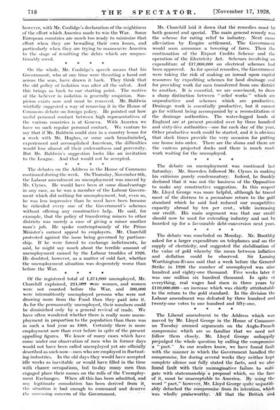The debates on the Address in the House of Commons
continued during the week. On Thursday, November 8th, the Labour amendment on unemployment was moved by Mr. Clynes. He would have been at some disadvantage in any case, as he was a member of the Labour Govern- ment which did nothing for unemployment, but, even so, he was less impressive than he need have been because he ridiculed every one • of the Government's schemes without offering any constructive help. He said, for example, that the policy of transferring miners to other districts was merely a case of giving a miner another man's job. He spoke contemptuously of the Prime Minister's earnest appeal to employers. Mr. Churchill protested against the issue being governed by partisan- ship. If he were forced to exchange indictments, he said, he might say much about the terrible amount of unemployment caused by the Labour troubles of 1926. He doubted, however, as a matter of cold fact, whether the unemployment -situation was desperately worse than before the War.
• * *






































 Previous page
Previous page